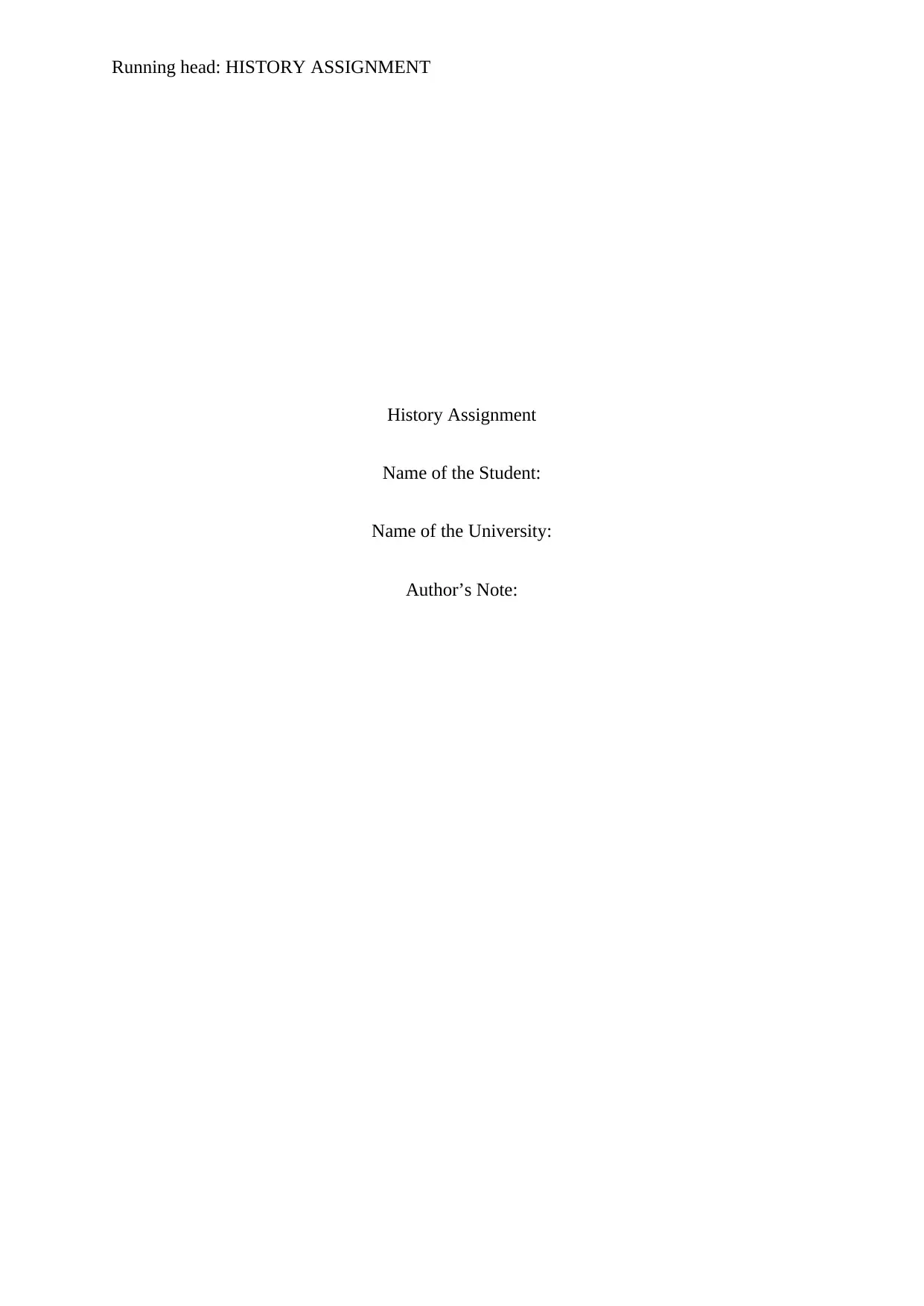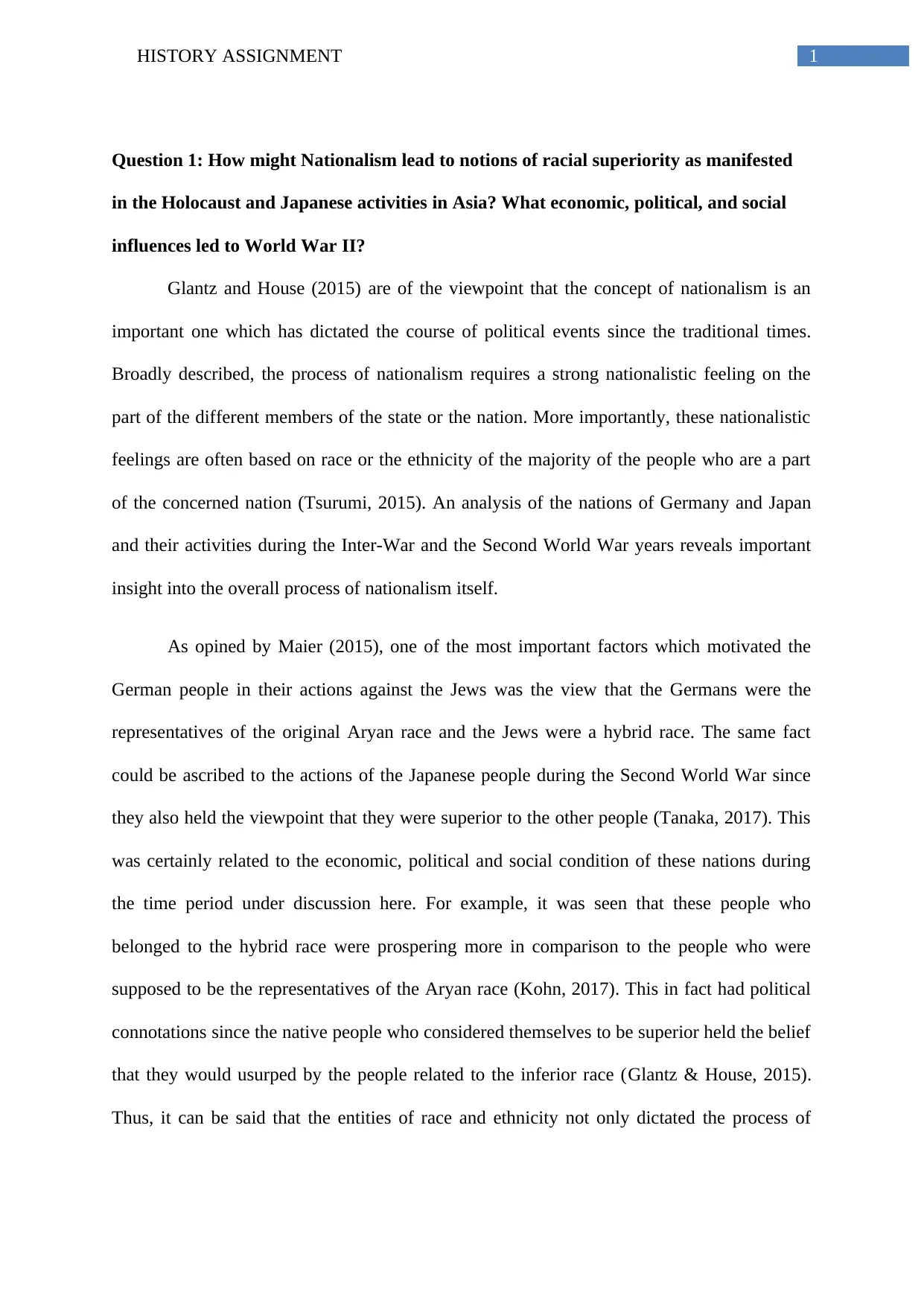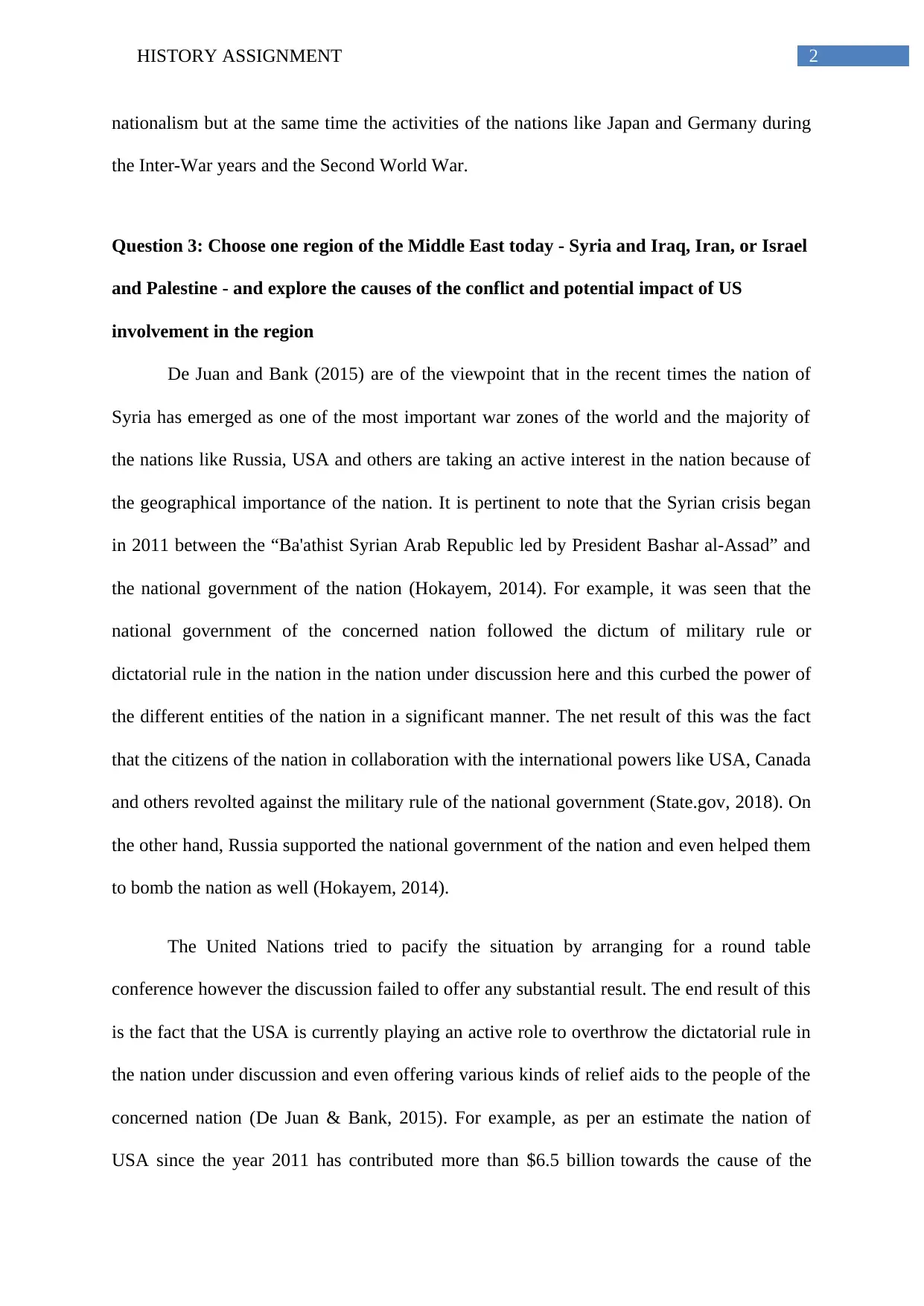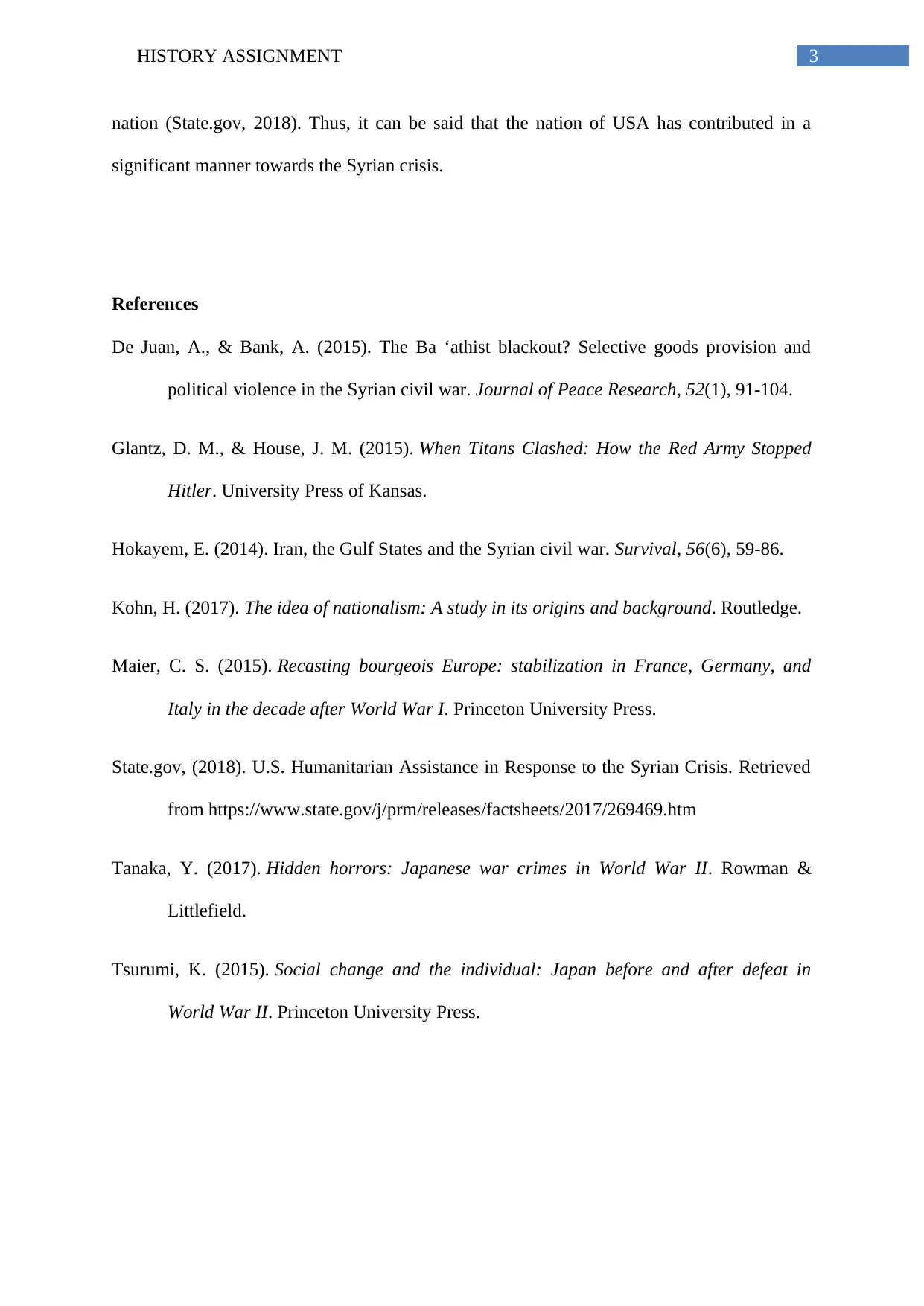Analyzing Nationalism, WWII Influences, and Middle East Conflict Today
VerifiedAdded on 2023/04/19
|4
|1039
|425
Essay
AI Summary
This history assignment delves into the complex interplay of nationalism, the origins and influences of World War II, and the ongoing conflicts in the Middle East. It examines how nationalism fueled notions of racial superiority, as seen in the Holocaust and Japanese actions in Asia, linking these ideologies to the economic, political, and social conditions of the time. The assignment further analyzes the Syrian conflict, exploring the causes and the impact of US involvement, highlighting the roles of various international powers. The essay concludes by referencing sources that provide further insight into these historical and contemporary issues. Desklib offers this and many more solved assignments and resources for students.

Running head: HISTORY ASSIGNMENT
History Assignment
Name of the Student:
Name of the University:
Author’s Note:
History Assignment
Name of the Student:
Name of the University:
Author’s Note:
Paraphrase This Document
Need a fresh take? Get an instant paraphrase of this document with our AI Paraphraser

1HISTORY ASSIGNMENT
Question 1: How might Nationalism lead to notions of racial superiority as manifested
in the Holocaust and Japanese activities in Asia? What economic, political, and social
influences led to World War II?
Glantz and House (2015) are of the viewpoint that the concept of nationalism is an
important one which has dictated the course of political events since the traditional times.
Broadly described, the process of nationalism requires a strong nationalistic feeling on the
part of the different members of the state or the nation. More importantly, these nationalistic
feelings are often based on race or the ethnicity of the majority of the people who are a part
of the concerned nation (Tsurumi, 2015). An analysis of the nations of Germany and Japan
and their activities during the Inter-War and the Second World War years reveals important
insight into the overall process of nationalism itself.
As opined by Maier (2015), one of the most important factors which motivated the
German people in their actions against the Jews was the view that the Germans were the
representatives of the original Aryan race and the Jews were a hybrid race. The same fact
could be ascribed to the actions of the Japanese people during the Second World War since
they also held the viewpoint that they were superior to the other people (Tanaka, 2017). This
was certainly related to the economic, political and social condition of these nations during
the time period under discussion here. For example, it was seen that these people who
belonged to the hybrid race were prospering more in comparison to the people who were
supposed to be the representatives of the Aryan race (Kohn, 2017). This in fact had political
connotations since the native people who considered themselves to be superior held the belief
that they would usurped by the people related to the inferior race (Glantz & House, 2015).
Thus, it can be said that the entities of race and ethnicity not only dictated the process of
Question 1: How might Nationalism lead to notions of racial superiority as manifested
in the Holocaust and Japanese activities in Asia? What economic, political, and social
influences led to World War II?
Glantz and House (2015) are of the viewpoint that the concept of nationalism is an
important one which has dictated the course of political events since the traditional times.
Broadly described, the process of nationalism requires a strong nationalistic feeling on the
part of the different members of the state or the nation. More importantly, these nationalistic
feelings are often based on race or the ethnicity of the majority of the people who are a part
of the concerned nation (Tsurumi, 2015). An analysis of the nations of Germany and Japan
and their activities during the Inter-War and the Second World War years reveals important
insight into the overall process of nationalism itself.
As opined by Maier (2015), one of the most important factors which motivated the
German people in their actions against the Jews was the view that the Germans were the
representatives of the original Aryan race and the Jews were a hybrid race. The same fact
could be ascribed to the actions of the Japanese people during the Second World War since
they also held the viewpoint that they were superior to the other people (Tanaka, 2017). This
was certainly related to the economic, political and social condition of these nations during
the time period under discussion here. For example, it was seen that these people who
belonged to the hybrid race were prospering more in comparison to the people who were
supposed to be the representatives of the Aryan race (Kohn, 2017). This in fact had political
connotations since the native people who considered themselves to be superior held the belief
that they would usurped by the people related to the inferior race (Glantz & House, 2015).
Thus, it can be said that the entities of race and ethnicity not only dictated the process of

2HISTORY ASSIGNMENT
nationalism but at the same time the activities of the nations like Japan and Germany during
the Inter-War years and the Second World War.
Question 3: Choose one region of the Middle East today - Syria and Iraq, Iran, or Israel
and Palestine - and explore the causes of the conflict and potential impact of US
involvement in the region
De Juan and Bank (2015) are of the viewpoint that in the recent times the nation of
Syria has emerged as one of the most important war zones of the world and the majority of
the nations like Russia, USA and others are taking an active interest in the nation because of
the geographical importance of the nation. It is pertinent to note that the Syrian crisis began
in 2011 between the “Ba'athist Syrian Arab Republic led by President Bashar al-Assad” and
the national government of the nation (Hokayem, 2014). For example, it was seen that the
national government of the concerned nation followed the dictum of military rule or
dictatorial rule in the nation in the nation under discussion here and this curbed the power of
the different entities of the nation in a significant manner. The net result of this was the fact
that the citizens of the nation in collaboration with the international powers like USA, Canada
and others revolted against the military rule of the national government (State.gov, 2018). On
the other hand, Russia supported the national government of the nation and even helped them
to bomb the nation as well (Hokayem, 2014).
The United Nations tried to pacify the situation by arranging for a round table
conference however the discussion failed to offer any substantial result. The end result of this
is the fact that the USA is currently playing an active role to overthrow the dictatorial rule in
the nation under discussion and even offering various kinds of relief aids to the people of the
concerned nation (De Juan & Bank, 2015). For example, as per an estimate the nation of
USA since the year 2011 has contributed more than $6.5 billion towards the cause of the
nationalism but at the same time the activities of the nations like Japan and Germany during
the Inter-War years and the Second World War.
Question 3: Choose one region of the Middle East today - Syria and Iraq, Iran, or Israel
and Palestine - and explore the causes of the conflict and potential impact of US
involvement in the region
De Juan and Bank (2015) are of the viewpoint that in the recent times the nation of
Syria has emerged as one of the most important war zones of the world and the majority of
the nations like Russia, USA and others are taking an active interest in the nation because of
the geographical importance of the nation. It is pertinent to note that the Syrian crisis began
in 2011 between the “Ba'athist Syrian Arab Republic led by President Bashar al-Assad” and
the national government of the nation (Hokayem, 2014). For example, it was seen that the
national government of the concerned nation followed the dictum of military rule or
dictatorial rule in the nation in the nation under discussion here and this curbed the power of
the different entities of the nation in a significant manner. The net result of this was the fact
that the citizens of the nation in collaboration with the international powers like USA, Canada
and others revolted against the military rule of the national government (State.gov, 2018). On
the other hand, Russia supported the national government of the nation and even helped them
to bomb the nation as well (Hokayem, 2014).
The United Nations tried to pacify the situation by arranging for a round table
conference however the discussion failed to offer any substantial result. The end result of this
is the fact that the USA is currently playing an active role to overthrow the dictatorial rule in
the nation under discussion and even offering various kinds of relief aids to the people of the
concerned nation (De Juan & Bank, 2015). For example, as per an estimate the nation of
USA since the year 2011 has contributed more than $6.5 billion towards the cause of the
⊘ This is a preview!⊘
Do you want full access?
Subscribe today to unlock all pages.

Trusted by 1+ million students worldwide

3HISTORY ASSIGNMENT
nation (State.gov, 2018). Thus, it can be said that the nation of USA has contributed in a
significant manner towards the Syrian crisis.
References
De Juan, A., & Bank, A. (2015). The Ba ‘athist blackout? Selective goods provision and
political violence in the Syrian civil war. Journal of Peace Research, 52(1), 91-104.
Glantz, D. M., & House, J. M. (2015). When Titans Clashed: How the Red Army Stopped
Hitler. University Press of Kansas.
Hokayem, E. (2014). Iran, the Gulf States and the Syrian civil war. Survival, 56(6), 59-86.
Kohn, H. (2017). The idea of nationalism: A study in its origins and background. Routledge.
Maier, C. S. (2015). Recasting bourgeois Europe: stabilization in France, Germany, and
Italy in the decade after World War I. Princeton University Press.
State.gov, (2018). U.S. Humanitarian Assistance in Response to the Syrian Crisis. Retrieved
from https://www.state.gov/j/prm/releases/factsheets/2017/269469.htm
Tanaka, Y. (2017). Hidden horrors: Japanese war crimes in World War II. Rowman &
Littlefield.
Tsurumi, K. (2015). Social change and the individual: Japan before and after defeat in
World War II. Princeton University Press.
nation (State.gov, 2018). Thus, it can be said that the nation of USA has contributed in a
significant manner towards the Syrian crisis.
References
De Juan, A., & Bank, A. (2015). The Ba ‘athist blackout? Selective goods provision and
political violence in the Syrian civil war. Journal of Peace Research, 52(1), 91-104.
Glantz, D. M., & House, J. M. (2015). When Titans Clashed: How the Red Army Stopped
Hitler. University Press of Kansas.
Hokayem, E. (2014). Iran, the Gulf States and the Syrian civil war. Survival, 56(6), 59-86.
Kohn, H. (2017). The idea of nationalism: A study in its origins and background. Routledge.
Maier, C. S. (2015). Recasting bourgeois Europe: stabilization in France, Germany, and
Italy in the decade after World War I. Princeton University Press.
State.gov, (2018). U.S. Humanitarian Assistance in Response to the Syrian Crisis. Retrieved
from https://www.state.gov/j/prm/releases/factsheets/2017/269469.htm
Tanaka, Y. (2017). Hidden horrors: Japanese war crimes in World War II. Rowman &
Littlefield.
Tsurumi, K. (2015). Social change and the individual: Japan before and after defeat in
World War II. Princeton University Press.
1 out of 4
Related Documents
Your All-in-One AI-Powered Toolkit for Academic Success.
+13062052269
info@desklib.com
Available 24*7 on WhatsApp / Email
![[object Object]](/_next/static/media/star-bottom.7253800d.svg)
Unlock your academic potential
Copyright © 2020–2026 A2Z Services. All Rights Reserved. Developed and managed by ZUCOL.





